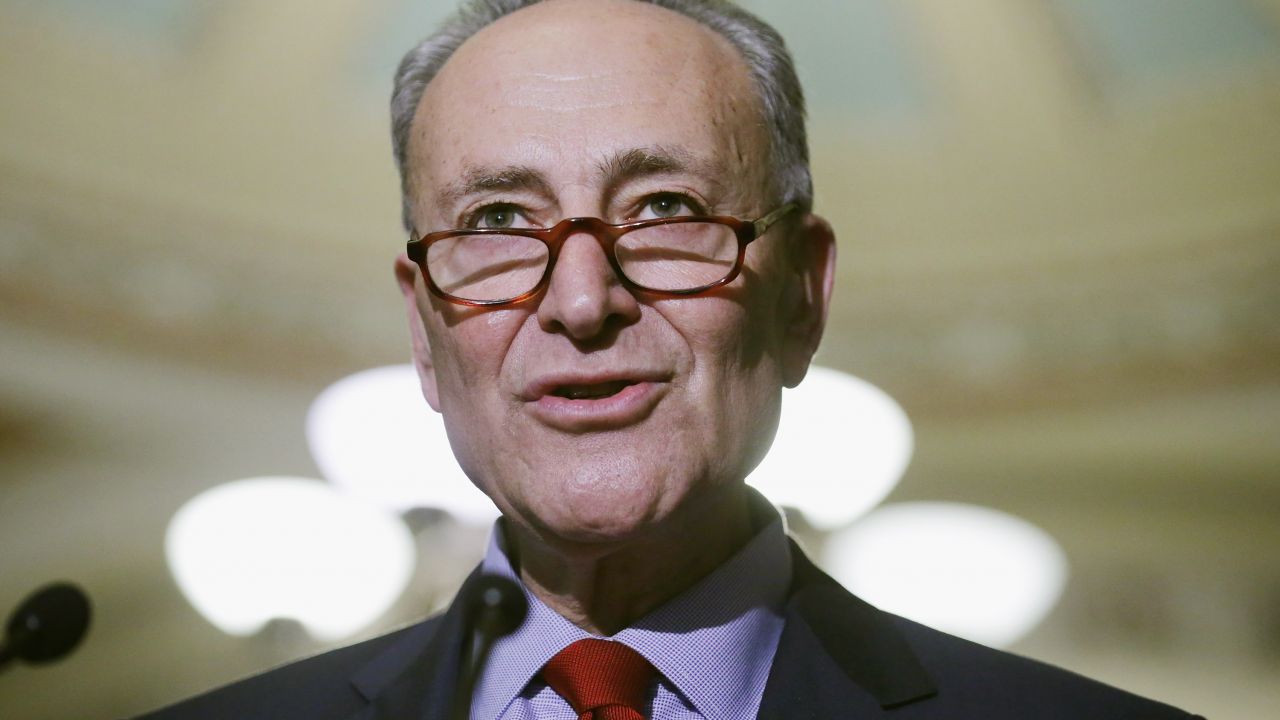
Sen. Chuck Schumer (D-NY) has developed a plan of campaign-finance and government-reform measures designed to tap into voter outrage over big money and special-interest influence. (Photo by Chip Somodevilla/Getty Images)
This post originally appeared at The American Prospect.
Senate Democrats focused on taking back control of the upper chamber in 2016 have unveiled an ambitious package of campaign-finance and government-reform measures designed to tap into voter outrage over big money and special-interest influence.
At a press conference outside the US Capitol Thursday, Democratic senators — along with leaders from campaign-finance advocacy groups — declared that they were committed to curtailing the influence of special interests and big money.
“If we’ve learned one thing in this election year, people believe that the system is rigged against them,” declared Sen. Chuck Schumer of New York, who developed the plan and is in line to become the majority leader if Democrats take back the Senate. “And they won’t even listen to proposals until they’re convinced you’re going to unrig the system — that’s what we’re here to do today.”
The plan’s chance of winning approval before Election Day is microscopic, given that Senate Majority Leader Mitch McConnell and the rest of the Republicans who control the chamber steadfastly oppose any type of campaign-finance reform. But Senate Democrats argue that the populist enthusiasm on display during this election will play to their advantage.
— Sen. Chuck Schumer
“Make no mistake about it: This will be a huge issue in the presidential, and in the senatorial and House campaigns,” Schumer said. “Those candidates who refuse to support proposals like this are going to pay a very significant price.”
Dubbed the “We the People Act,” the plan focuses on disclosure, lobbying reforms, a Federal Election Commission overhaul, and reversing the Supreme Court’s 2010 Citizens United ruling that deregulated outside spending.
“As practitioners, we senators see every day how unlimited spending, dark money and all the new Citizens United artillery of special-interest influence deforms and distorts our governance,” said Rhode Island Sen. Sheldon Whitehouse, adding that he’s seen the fossil-fuel industry leverage its influence to block climate-change legislation.
Specifically, the reform package includes a proposal to replace the politically gridlocked FEC with a more powerful independent agency. Also included is the DISCLOSE Act, which would help shine light on “dark” money by increasing disclosure of donors to social-welfare groups that engage in politics. And Democratic senators also want to crack down on “single-candidate” super PACs, which have become an increasingly popular end-run around campaign-contribution limits, by strengthening anti-coordination laws.
Senate Democrats have also joined progressive activists in calling for a constitutional amendment that would allow Congress to overturn a slew of campaign-finance court rulings, including Citizens United.
Finally, the plan aims to close the revolving door between K Street and Capitol Hill by banning all former members of Congress from lobbying either the House or Senate after retirement. Nearly half of retiring senators and one-third of retiring House members go on to become registered lobbyists. One element of the plan is a bill introduced by Sen. Tammy Baldwin of Wisconsin, which bans financial services companies from offering “golden parachute” bonuses to employees who take positions in the federal government, which many see as a way for Wall Street to invest in future access.
However, the policy plan has notable omissions. Most strikingly, perhaps, it does not include any mention of a small-donor matching program for congressional elections, which reform advocates say could serve as an effective counterweight to big-money donors. Both Hillary Clinton and Bernie Sanders, along with the vast majority of House Democrats, have endorsed the idea.
“This is the party’s opening bid,” says Mark Schmitt, who heads the political reform program for the liberal think tank New America. “If the opening bid doesn’t have some sort of small donor provision, that’s a disappointing step backward.”
“They’re not changing anything until they change the way campaigns are funded,” Harvard professor and reform advocate Lawrence Lessig told The Prospect. Lessig called the outlook for passing a constitutional amendment a pipe dream, given the absence of bipartisan support. He added that many of the proposed campaign-finance measures — including enhanced disclosure — give Democrats a tool to politically embarrass Republicans without actually getting at the core problems of a system Lessig says amounts to legalized corruption.
Democratic Rep. John Sarbanes of Maryland is the sponsor of small-donor matching legislation in the House. Sarbanes predicted that even though public financing isn’t part of the Senate Democrats’ plan now, it will likely be a part of an eventual bicameral reform package that is more comprehensive.
“Whether it gets in on the front end of the process or comes in later — as long as ultimately it is there when we are articulating it to voters, and when we’re in position to move — then I think it will be a strong package,” Sarbanes told The Prospect in an interview last week.
Polling conducted by the campaign-finance advocacy group Every Voice in December found that 72 percent of Americans support using small donor-focused reforms to overhaul the campaign-finance system.
The recently unveiled Senate platform also doesn’t include any measures focused on voting-rights threats or redistricting abuses, both areas of growing concern to civil rights and democracy advocates. In his final State of the Union address, President Obama called on Congress to tackle those issues.
Schumer and his colleagues will be walking a difficult line as on the one hand they tout their far-reaching package of reforms, even as they benefit from what is sure to be record levels of outside spending support from the Democratic Senatorial Campaign Committee and liberal super PACs. In the 2012 elections, in which Democrats tried unsuccessfully to keep control of the Senate, the DSCC spent nearly $145 million.
“Senate Democrats have accepted the fact that a lot will be spent against and for them. They have no control of that,” says Craig Holman, a government-affairs lobbyist with the progressive advocacy group Public Citizen. What they do have control over, Holman says, is defining the Democratic Party as the party opposed to dark money. “Schumer sees this as a big advantage and that’s why they want to bring this into the public dialogue,” Holman adds.
With polls consistently showing unprecedented levels of voter anger at the role of money in American politics, experts say running on a political process platform such as campaign financing — which in the past has failed to galvanize voters — could be more effective than ever.
“This is a different political moment,” says longtime political reformer and New York congressional candidate Zephyr Teachout, a Democrat. “People are looking for more than nibbling around the edges. It’s fantastic that Democrats are putting this at the center of what we need to do.”




